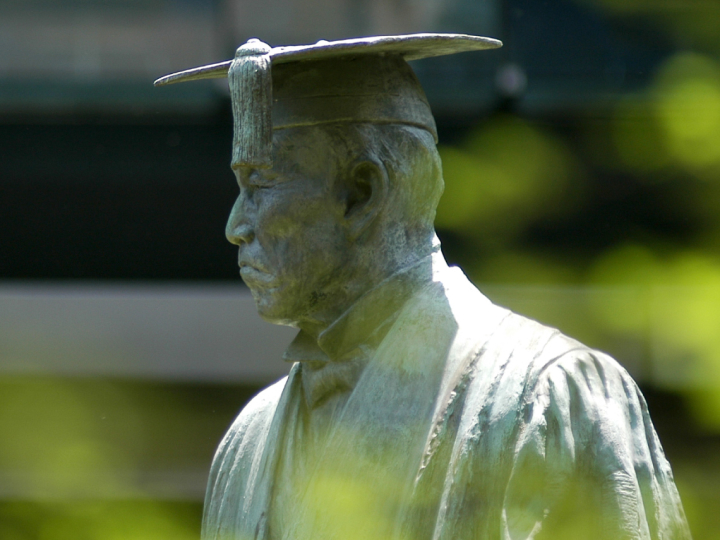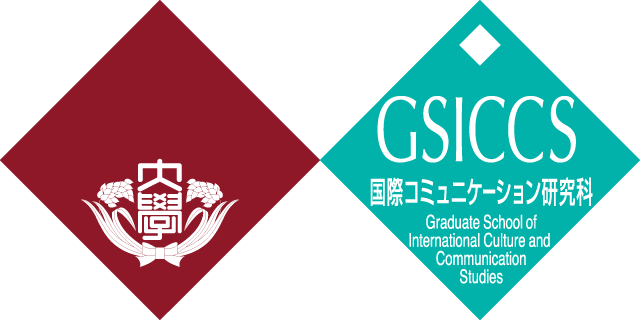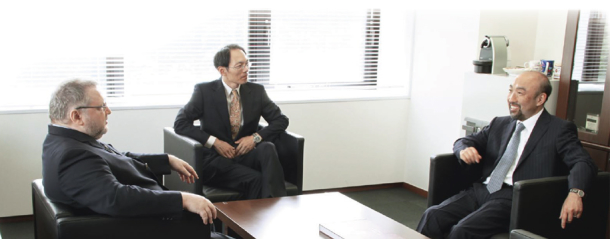- School Overview
- School Overview
School Overview

GSICCS Three Fundamental Policies
(1) Diploma Policy(Principles concerning the conferment of academic degrees)
The Graduate School of International Culture and Communication Studies fully takes advantage of Waseda University’s rich academic environment and dynamic student life to provide its students with the best possible culture and communication studies program, in which educational challenges, cultural values and diverse languages are brought together with the aim of cultivating generations of educated minds eager to contribute positively to the development of our global society.
International culture and communication studies is the study of the roles of communication networks seen respectively in linguistic, cultural, and social terms from both theoretical and practical perspectives, and including not only, at the micro level, interactions between individuals, but also the messages sent by individuals to society as a whole, and finally socio-political communication amongst public bodies and states. In the education and research endeavors of our graduate school, humanistic research in the fields of linguistic communication and cultural studies will be combined with a social scientific approach. In addition, in GSICCS English will be employed as the primary language of education and research.
According to the principles described above, in order to be awarded the degree of “Master of Arts (in International Culture and Communication Studies)”, Master’s students at GSICCS must not only be enrolled for at least two academic years and complete the credit requirements, but also must carry out directed research and submit a thesis of Master’s standard as evaluated by one chief and two sub examiners. Those who are awarded our master’s degree have acquired the following knowledge and abilities.
(1) Deep expertise in each person’s research area
(2) Extensive knowledge needed for an interdisciplinary approach
(3) Critical thinking skills rooted in an international perspective
(4) Ability to compile original thoughts into an academic paper according to the methodology of each research area
Further, in order to be awarded the degree of “Doctor of Philosophy (in International Culture and Communication Studies)”, Doctoral students at GSICCS must not only be enrolled for at least three academic years and complete the credit requirements, but also carry out directed research and submit a dissertation of Doctoral standard as evaluated by one chief and at least two sub examiners. Those who are awarded our doctoral degree have acquired the following knowledge and abilities.
(1) Advanced and cutting edge expertise in each person’s research area
(2) Expertise in a related area that contributes to each person’s research
(3) Ability to compose highly original academic papers rooted in international and interdisciplinary perspectives
(4) Ability to be independent as a researcher and to interact and communicate in a global academic community
(2) Curriculum Policy(Principles concerning the organization and implementation of the course of study)
The Master’s program at GSICCS offers post-graduate education and provides research direction according to three distinct studies plans, each cultivating both international and interdisciplinary perspectives: Language & Communication, centering on linguistic issues; Culture & Communication, centering on cultural issues; and Society & Communication, centering on social issues.
In Basic Courses, students learn the theory that they will need to undertake sustained and effective research in the field of international culture and communication studies. In Specialized Courses, students master the knowledge that they will need to undertake research in the fields of language studies, cultural and media studies, and social sciences. Moreover, by enrolling in Related Courses, students can acquire practical skills useful in maximizing the specialist knowledge acquired in each discipline.
Directed Research seminars, under the guidance of research director, create an environment in which students can write master’s theses that are international, interdisciplinary, and unique.
In the Doctoral program, as their principal areas of research, students can focus on (1) The Globalizing World and Communication Systems, (2) Material Characteristics and Social Roles of Various Communication Media, (3) Digital Technology and Visual Culture, or (4) Communication and Representaion, which they are encouraged to analyze by combining approaches based on Language Studies, Cultural and Media Studies, and Social Studies.
Curriculum requirements include a Ph.D Seminar, which provides both specialized and interdisciplinary research guidance based on three different approaches; and a course of Independent Study, which optimizes their ability to develop their own academic interests.
Direct Research seminars, under the guidance of research director supported by two professors acting as deputy directors, offer assistance to students as they write their Doctoral dissertation.
(3) Admission Policy(Principles concerning enrollment)
With its unique education and research ideals based on the concept of “academic independence,” Waseda University welcomes a large number of students, from both within Japan and around the world, with a strong foundation of academic ability, intellectual curiosity, and willingness to study with the enterprising spirit that is at the core of the school’s philosophy.
An important objective at GSICCS is to foster global human resources with the ability with critical thinking skills rooted in an interdisciplinary and international perspective, based on the acquisition of degrees in English. Thus, those completing our Master’s program, in addition to pursuing advanced study in graduate schools both inside and outside Japan, including in GSICCS’s own Doctoral course, are expected to enter multi-national companies in the finance, trading, media and IT industries, as well as NPOs and NGOs, among other international organizations. In addition, graduates of the
doctoral program are expected to develop and disseminate their research internationally as independent researchers.
To achieve the above aims, there is a need to recruit outstanding talent who have high language skills to carry out research based on English and who are willing to study international culture and communication studies theoretically and practically from a specialized and multifaceted perspective from widely diverse cultural backgrounds from both within and beyond Japan. So,our master program employs an AO (Admissions Office) entrance system to enable selection of students with diverse cultural backgrounds.
Under our AO admissions system, applicants who have a wide range of academic knowledge, high research ability, excellent logic and English expression skills will be selected through a comprehensive selection process based on application documents including the results of the English Language Proficiency Test.
In addition, in order to actively encourage applications by outstanding undergraduate students from within Waseda University, we have introduced a procedure for admission via Intramural Selection by Recommendation.
To admit students with an advanced level of knowledge in international culture and communication studies, the Doctoral program also offers an AO admissions system and an intramural selection process for graduates of the GSICCS Master’s program. In addition to the submitted documents, the AO admissions system requires applicants to submit English proficiency test scores, etc., and participation in an interview, if necessary.In both cases, the admissions process entails a close evaluation of the applicant’s education track record, up to and including their performance in the Master’s program, along with an assessment of their potential and promise with regard to future research.
Learning Outcomes & Assessment Policy
Please refer to the URL below.
https://waseda.box.com/s/ymty95mxslfmn7fto09470f7xicg2txg
Towards a New Style of Graduate Program
Contributing to Society
Law Graham:With me I have two of the people who have been most closely involved in setting up GSICCS: Takashi Aso, first dean of the new school,and Norimasa Morita, current dean of SILS.Together the three of us will be chatting about how and why GSICCS came into being. To start with, how long has the project been in the works?
MORITA Norimasa:If I remember rightly, it took well over two years from first conception to eventual approval by the Ministry of Education in the summer of 2012. In fact, the final proposal submitted for approval bore very little similarity to the first rough plan that was drafted back around 2010. In between there were many rounds of discussion and negotiation among SILS staff,within Waseda as a whole, and with the public bodies concerned. However, the aims for the grad. school that we set up right at the beginning remain fundamentally unchanged.
LG:Briefly, what are those aims?
ASO Takashi:Well, first of all, we wanted to make something the Japanese education system badly needed but didn’t have already. There are not many grad. schools which do not require Japanese language fluency, and even fewer that offers courses with an interdisciplinary focus. More and more, academic research is being conducted on a topic-basis, crossing traditional disciplinary boundaries, and we wanted that to be reflected in the curriculum.
MN:Traditionally, Japanese graduate schools in the humanities and social sciences have been considered solely as a training ground for future academics. But, while the number of grad.schools is increasing, university and research posts generally are not. So grad. schools have to prepare their students for careers other than in higher education. While GSICCS will still provide a rigorous specialist education for those who want to become academics, it will also offer opportunities for those intending to work as generalist-specialists outside academia.
Everything Starts with Communication
AT:At the same time, we wanted to make GSICCS an institution where both faculty and students can address the most challenging and pressing issues of the 21st century. Traditional problems and approaches don’t go away, but they need reinterpreting in a modern light. Now, for example, we need to combine theoretical expertise with practical skills, whether in communication or problem-solving.
MN:In an era of globalization, the world becomes much more standardized, but regions and areas don’t lose their importance. Just as America is now the single global power, so English is now arguably the sole world language. But the large majority of inhabitants don’t speak it. Global culture is spreading into the far corners of the world, thanks to progress in communications technology, but local cultures have not lost their significance. Even after the Cold War ended, the world hasn’t been peaceful. There are now more local conflicts and wars than at any other time in history. That’s why communication is at the center of our concerns. In GSICCS the various aspects of communication are up for investigation, whether linguistic, cultural, or institutional.
A Truly International Community
LG:And what about the “I” in GSICCS?
AT:We wanted the school to be truly international,not just in the subjects of the curriculum, but also in the community that the school fostered. Our teaching staff speak several languages and are involved in research on global issues, with many of them coming from outside Japan. We are expecting that at least half our applicants will likewise be from overseas, and we hope that small classes will encourage passionate debate and warm friendship among students from different backgrounds and with different views of the world.
LG:The final thing we should mention is that GSICCS undoubtedly builds on the successes of SILS, with its diverse student body and interdisciplinary curriculum. Some people say it is crazy to try to construct a grad. school on top of a liberal arts department, but you have already explained clearly why that it is far from being the case. Over the last eight years, the stimulation of working with bright and lively young minds from all over the world in the new undergraduate school has been of tremendous benefit to all of us. So we are excited at the prospect of taking things to the next level. Thank you both for sharing your experiences and ideas.

